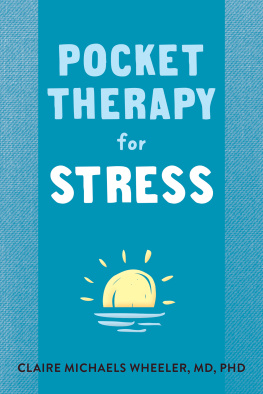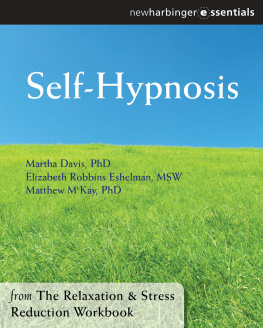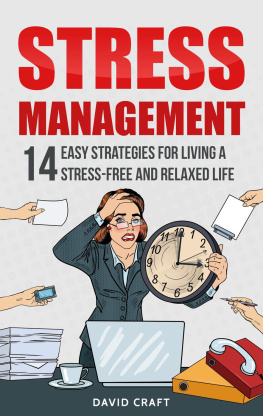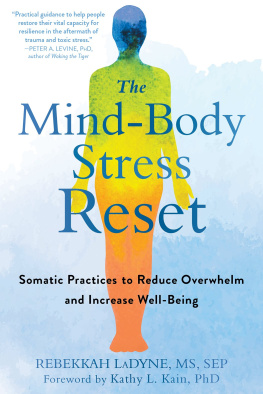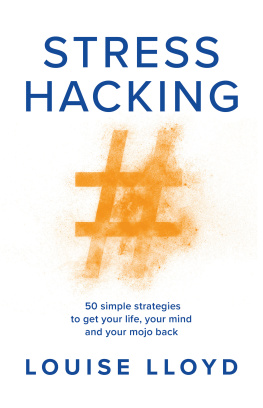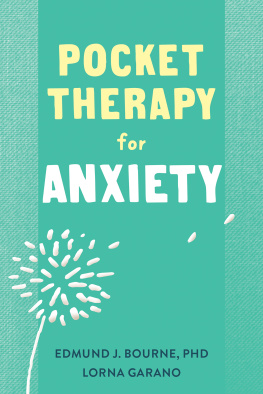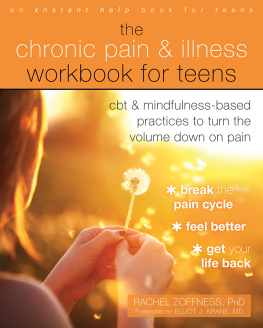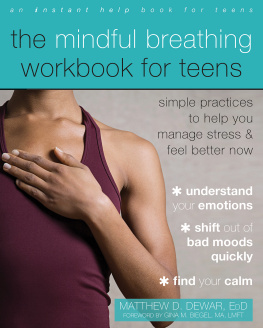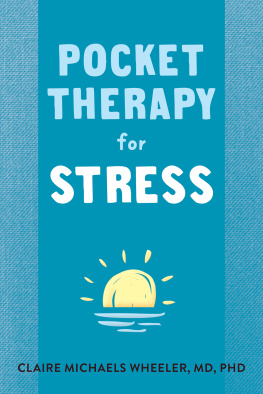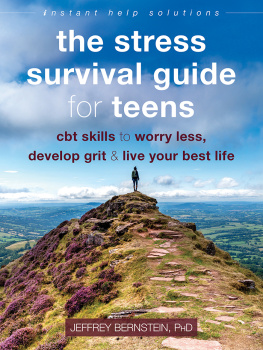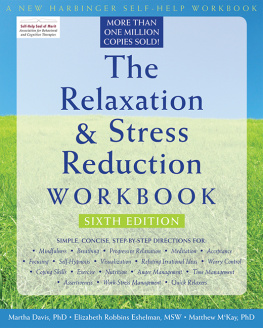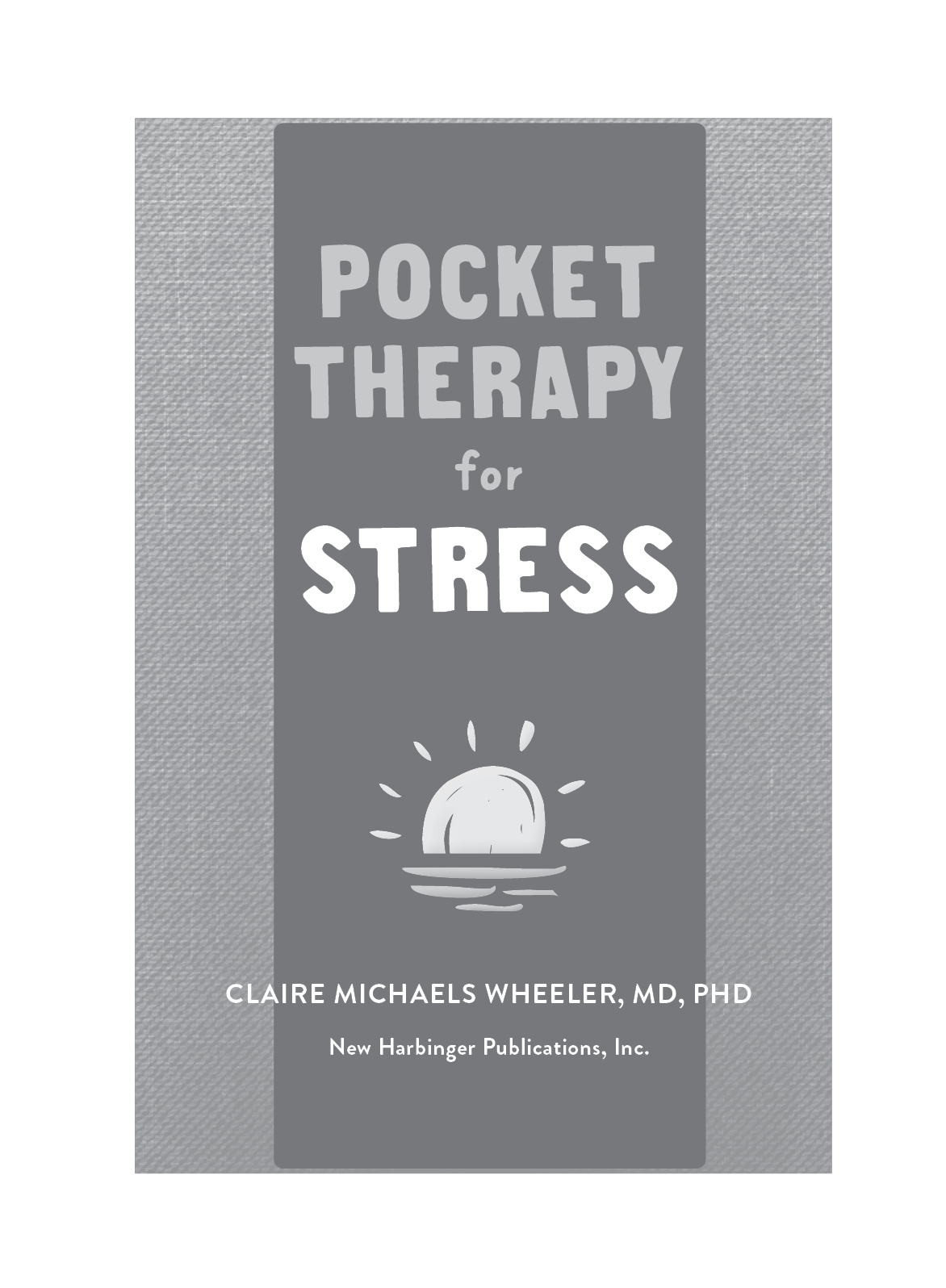Claire Michaels Wheeler is a gifted health professional and author who has a wonderfully authentic way of telling the story of the mind-body and its complex systems, making it accessible for everyone with humor and respect.
Toni Quinn Bankston, LCSW-BACS, child and family trauma therapist, CEO of Baton Rouge Childrens Advocacy Center, and senior faculty and consultant for The Center for Mind-Body Medicine
Claire Michaels Wheeler brilliantly succeeds in addressing a critical issuehow to cope with stress. This essential framework is a must-read for all those who struggle with the stresses of daily life. Her insights into the biology of stress, particularly the neuroscience, present a blueprint for understanding why stress management is a vital part of our health and happiness.
Katherine Grill, PhD, CEO and cofounder of Neolth, professor at the California Institute of Integral Studies, and behavioral neuroscientist and integrative specialist
This book is a journey to your inner self, and enhances the understanding of your environment. Science is linked with your body and mind. It teaches you how to understand and analyze your stressors, and to address them in an objective and practical way. Claire Michaels Wheelers book helped me to recognize my anxiety triggers, and to develop coping mechanisms. To apply the mind-body approach is liberating, and will help you develop more inner strength.
Carole Zen Ruffinen, MPH, pharmacist, and project coordinator for Doctors Without Borders
Publishers Note
This publication is designed to provide accurate and authoritative information in regard to the subject matter covered. It is sold with the understanding that the publisher is not engaged in rendering psychological, financial, legal, or other professional services.
Distributed in Canada by Raincoast Books
Copyright 2020 by Claire Michaels Wheeler New Harbinger Publications, Inc.
5674 Shattuck Avenue
Oakland, CA 94609
Cover design by Sara Christian; Acquired by Elizabeth Hollis Hansen; Edited by Marisa Sols; Text design by Michele Waters and Amy Shoup
All Rights Reserved
Printed in the United States of America
Library of Congress Cataloging-in-Publication Data on file
Contents
Introduction
Stress robs us of so much. Its like a thief in the night (literally, it steals our ability to sleep well). It creeps up on us gradually. We often dont realize stress is an issue until we develop high blood pressure or chronic low-back pain or other symptoms.
If youre already grappling with a medical condition, reducing stress can dramatically alter the course of your illness. If youre not, taking steps to manage your stress levels can help you preserve both your physical and your mental health.
The health benefits of managing stress are undeniable. But theres another reason to do it. Clearing your body and mind of unnecessary stress and tension allows you to thrive. It makes room for creativity and spiritual growth. It frees you to pursue valued activities, build happier relationships, and truly appreciate the strength and vibrancy of your body.
This little book offers ten simple but powerful ways to dramatically decrease the negative effects of stress on your life. Some results will be immediate: less muscle tension, clearer thinking, better sleep. Others will be like money in the bank: changes that will help you live a longer, happier, more fulfilling life, such as in your relationships and diet.
In this book youll find exercises, questionnaires, and writing prompts that will help you discover:
- what stresses you,
- how to effectively respond to stressors, and
- how you can stress much, much less.
In addition, the Explore section at the end of each chapter will take you deeper into the chapter topic. Be sure to dedicate a blank journal or notebook (or use your phones notes app) as a companion to this book. In it youll document your insights and log your new stress-busting skills.
What Is Stress?
Stress is a processan interaction between you and your environment. Most researchers and clinicians define stress as the internal experience that arises when lifes challenges and pressures exceed your perceived ability to cope . Lets look at this definition closely. First, the situation that arises in you is a physical, emotional, psychological, and social phenomenon. In other words, stress is a holistic response . Every part of youbody, mind, spirit, and relationshipsis affected by the challenges of daily life. The good news is that each part of you can be called upon as a resource for managing these challenges.
Second, stress is determined by how well you think you can cope. Fortunately, coping is a skill that anyone can improve. Coping is the antidote to stress, and the key to better coping is perception. In other words, the meaning of everything that happens to you is entirely up to you. Within the boundaries of normal human existence, stress is not what happens to you, its what you think and feel about what happens to you. This means that you can control the amount of stress in your life. How?
- You can change your thoughts about whats going on around you.
- You can change how you react to whats going on around you.
- You can take charge of the fearful, worried, and anxious thoughts that plague your mind, even when youre in a safe, comfortable situation.
- You can choose to avoid situations that create stress for you.
- You can choose to do things that create peace for you.
In this book, well explore simple solutions to the problem of stress, based on the power you have right now to change your thoughts, access your inner reserves of strength and vitality, learn new skills, and make new, healthy connections to the world around you.
Acute vs. Chronic Stress
Generally speaking, there are two kinds of stress: acute and chronic . Acute (temporary) stress is useful; chronic (long-lasting) stress is less useful and can in fact be harmful.
The acute stress response the immediate, automatic response to a stressful eventis one humans share with all other mammals. Its a survival mechanism that causes profound, nearly instantaneous changes in every body system. The general theme is Danger! Run away!
Immediately after you perceive a threat, your brain starts sending messages and releasing hormones that change your state from relaxed to red alert. Heart rate and blood pressure increase, and blood gets shunted away from your skin and digestive organs and into your brain and the large muscles of your body. All of this helps you figure out how to run to safety and gives you the leg power to do so.
In an ideal scenario, once the threat has passed, all systems return to normal and youre able to relax. Your body is designed to do this automatically. But heres where we humans, with our big brains and vast imaginations, come into trouble. If we keep thinking about the past threatimagining all the terrible things that could have happened, what our friends would think, how much it would have cost, and on and onwe keep the threat alive. If we get stuck in threatened thinking, we get stuck in the chronic stress response .
Breaking the cycle of chronic stress starts in the here and now. For some people, its helpful to follow up with therapy that will help you make sense of the past. But for everyone, learning simple, effective ways to cope with stress right now is the best way to start.

